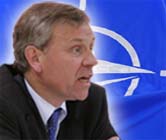De Hoop Scheffer: NATO is here to stay
 Brussels - NATO needs to forge closer ties with the European Union and other global actors in order to tackle new challenges such as energy security, climate change and a possible dirty bomb attack by terrorists, the alliance's chief said Tuesday.
Brussels - NATO needs to forge closer ties with the European Union and other global actors in order to tackle new challenges such as energy security, climate change and a possible dirty bomb attack by terrorists, the alliance's chief said Tuesday.
In a speech delivered to a security think tank in Brussels, NATO Secretary General Jaap de Hoop Scheffer also said that while the transatlantic alliance did not aspire to become a "globo-cop," it would remain a force to be reckoned with in spite of the rise of other key players such as Russia, China or India.
"Even 10 years from today, no other group of nations will cooperate more closely among each other. Nor will there be any other group that can generate a similar kind of 'magnetism' in terms of promoting political and security cooperation. And no other group of nations will have the institutional toolkit that is essential to facilitate such cooperation - and the best tool is NATO," he said.
De Hoop Scheffer identified five broad challenges facing the alliance over the next decade.
The first is the problem of so-called "ungoverned spaces" created by failed states and which may provide safe havens for terrorism and organized crime.
"At least in some cases, outside intervention will be necessary to avert greater damage," the secretary general said.
The second is that posed by globalization, which is seen as providing terrorists with easier access to destructive weapons.
"I am not thinking of a nuclear 9/11, but a terrorist attack with a radiological weapon certainly can no longer be considered 'science fiction,'" he said.
The September 11, 2001, terrorist attacks on New York and Washington are often referred to as 9/11 using the US system for writing dates.
The other major challenges identified by de Hoop Scheffer are the proliferation of weapons of mass destruction, energy security and the effects of climate change, which "could confront us with a whole range of unpleasant developments" - such as greater migration and disputes over scarce water and arable land - and which "no single nation-state has the power to contain."
His proposed remedies include increasing the alliance's military effectiveness through more equipment and less caveats, and improving cooperation with other actors such as the EU, the United Nations, non-governmental organizations and non-NATO countries.
In this respect, de Hoop Scheffer said he had high expectations about France's role in holding the rotating presidency of the EU, during the second half of the year.
France has vowed to place defence issues high up the EU agenda, while President Nicolas Sarkozy has hinted that his country is ready to rejoin NATO's military command structure. (dpa)